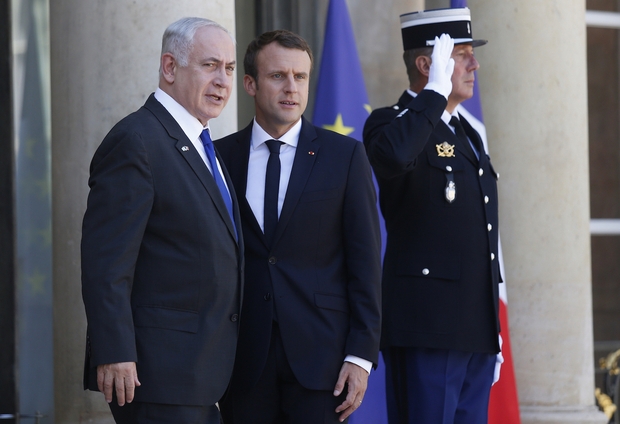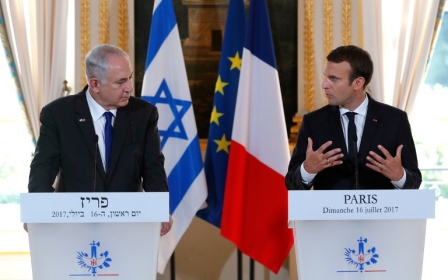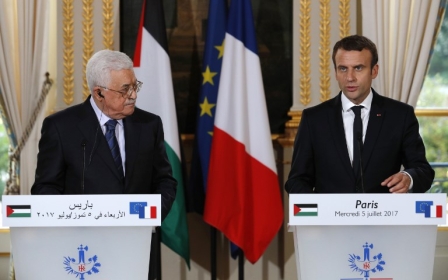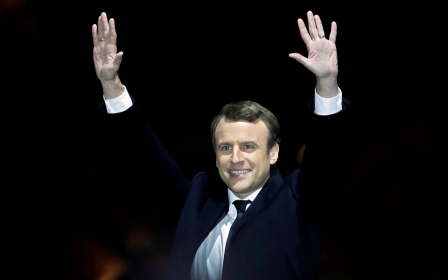INTERVIEW - Alain Gresh: BDS reveals negative image of Israel

PARIS – When asked on 27 November 1967 about the situation in the Middle East during a press conference on the Six-Day War, French President Charle De Gaulle said: “[Israel] is organising, on the territories which it has taken, an occupation which cannot work without oppression, repression and expulsion – and if there appears resistance to this, it will in turn call it ‘terrorism’.”
This statement is one of many that mark Alain Gresh and Hélène Aldeguer mention in their new book, Un chant d’amour. Israël-Palestine, une histoire française [A love song. Israel-Palestine, a French story].
The book brings together infamous quotes and archive material from the time of the 1956 Suez crisis - which marked the beginning of an alliance between France and Israel - and the the Six-Day War, which saw French public opinion taking up the side of Israel.
The book also discusses Fancois Mitterrand’s address to the Knesset and the siege of West Beirut as well as Jacques Chirac’s fit of anger in Jerusalem and Francois Hollande’s “love song for Israel. It therefore brings into light an understanding of why the Israeli-Palestinian conflict has been dubbed the ‘French passion’.
The book also documents a few forgotten – or little known – facts including France-Soir newspaper’s front page announcing that the Egyptians had attacked Israel on 5 June 1967, when in fact the opposite had actually happened.
Prior to 1967, Israel had signed a contract for the purchase of 12 missile-launcher speedboats. Seven had been delivered, but because of the embargo agreed by De Gaulle in 1969, five remained in the harbour of Cherbourg. On 25 December 1969, members of an Israeli commando team took control of the five boats and sailed towards Israel, where they were welcomed as heroes.
Middle East Eye: Why do describe the Israeli-Palestinian issue as a “French passion”?
Alain Gresh: For several reasons. This conflict has been at the top of the news for the past 50 years. Other wars - such as Vietnam or the crises in Latin America - have certainly mobilized French society, but they lasted for shorter periods of time. The continuity of the Israeli-Palestinian conflict is a significant factor in making it important for the French.
Also, since the creation of Israel, there has been a special relationship between Israel and France. All French political forces - including the communist party in 1947 and 1948 - have shown fairly broad support for the Zionist movement. And in 1956, during the Israeli aggression against Egypt, a strategic alliance was created between France, Great Britain and Israel.
Moreover, the largest Jewish and Muslim diaspora communities live in France. The Jewish communities started to show support for Israel in 1967, and have continued to do so especially in the 1970s and 1980s. In a similar fashion, the French Muslim communities’ support for the Palestinians peaked in the 1990s, during the first and then the second Intifada.
We should also bear in mind the geographical and human proximity of this region to France, which considers the conflict more of a regional issue.
Lastly, France has also played a special role in the region. It was a colonial power with interests in Lebanon and Syria.
And therefore, for the French, the Israeli-Palestinian conflict is not merely a matter of international politics, but it is also an issue of domestic affairs.
MEE: Does this conflict still have a polarizing effect in France as much as it used to?
AG: Some sense of weariness has grown in France regarding the conflict, but it remains an important issue. I would have expected that the situation unfolding in Gaza would have led to strong mobilisation in France, but that has not been the case. That may be due to the internal crisis within the Palestinian movement however.
In the history of colonial movements, there have been two main scenarios: settlers exterminated local populations, such as in Australia, Canada, New Zealand and the United States, or they remained a minority and the locals retaliated such as in Algeria or South Africa.
The case of Israel-Palestine is the only one where the colonial movement succeeded but also failed in totally expelling the natives. This has obviously created an explosive situation that will remain.
MEE: The strategic alliance between France and Israel in 1956 took place against the backdrop of the Algerian War of Independence, which Egypt’s Nasser was an active supporter of. Can ‘French passion’ for the issue therefore be explained through this the ‘Algerian paradigm’?
AG: It is true that the 1967 war seen by some right-wing French as revenge for the Algeria War. But later, in the 1970s and 1980s, the colonial paradigm to this conflict was not as prominent. It only came back with the resurgence of the colonial debate in France as young people of North African descent started to identify with the Palestinian struggle.
MEE: More broadly, why does this conflict seem to bring so many people together?
AG: I reflected on this question in a book entitled De quoi la Palestine est-elle le nom? [Of what is Palestine the name?]. Since the 1960s, three conflicts have played a catalytic role in world history: Vietnam, South Africa, and Palestine. The Palestinian conflict is the only conflict that has established an international solidarity movement. People see in it a certain truth about the international situation, and they establish some sort of link between their situation and Western domination.
MEE: Beyond its political dimension, doesn’t this conflict also appeal to a collective imagination, including a religious one?
AG: This religious dimension is important, but has not always been there. In the origins of Zionism, a religious dimension was non-existent. It seems to me that in Jewish history, the famous prayer that “next year [will be] in Jerusalem” was merely an abstract idea. Until 1948, Jerusalem was where pious Jews went for their pilgrimage or to be buried. The religious dimension only gained importance in Israel since 1967. There is also the nature of Europeans relationship with the Jewish issue; They feel a sort of guilt because of the genocide.
MEE: How do you explain the support of certain European far-right parties for the state of Israel? You mentioned in your book that in 1967, Xavier Vallat, general commissioner for the Jewish issues under the Vichy regime, published a column in the far-right Minute newspaper calling for the victory of Israel because French Jews were, according to him, destined to live there.
AG: I have always been convinced that some pro-Zionists are anti-Semitic. Vallat thought that the Jews would never integrate into France and that they had to go to Israel. Today, in Europe, the far right is not essentially anti-Semitic but anti-Muslim. They consider Israel an ally. We saw that in the case of the anti-Soros anti-Semitic billboard campaign in Hungary.
The fight against terrorism has also established a connection between Europe’s far right and Israel. For instance, when Francois Fillon visited Israel in 2006, he said that France was fighting “in the same trench” as Israel against terrorism. For many, Israel appears to be a Western bastion and therefore an ally against the Islamism.
MEE: You mention in your book that the French intelligentsia did not conceive of Israel as a colonial project. Why was that the case?
AG: The most emblematic French intellectuals at the time, Jean-Paul Sartre and Simone de Beauvoir, were the ones who went the furthest, among the French radical left, in supporting anti-colonialist movements. They supported the [Algerian] National Liberation Front in particular.
Yet, the Jewish genocide weighed heavily in their conception of Israel as distinct from colonialism. Thus, Sartre wrote a foreword in an issue of Les Temps modernes in June 1967 – the issue in which Maxime Rodinson published his famous piece “Israel, a colonial fact?” – saying: “Our Arab friends say they are not anti-Semitic but that they are against Israelis. Yet, they cannot stop us from thinking that Israelis are also Jews.” That was written only twenty years after the genocide.
Within French intellectual circles, Zionism has long been regarded as a national liberation movement. Zionism was born at the end of the 19th century, during the turmoil of the European national liberation movements. European colonialism had seen the conquering of other countries as a means of bringing them civilization.
The colonial dimension of the Zionist enterprise was therefore not perceived as such. In my opinion, one of the weaknesses of the Palestinian solidarity movement is precisely that it does not understand this colonial dimension.
MEE: You mention in your book that this conflict is also one of narratives and that Israel had managed to win this battle within French public opinion for a while. But you also mention that things have been changing. When was this tipping point?
AG: This battle of narratives is essential. This is why the Boycott, Disinvestment and Sanctions [BDS] movement bothers Israel so much. It is because BDS reveals a negative image of Israel.
In 1967, there was a positive image of Israel in France, but that changed dramatically with the invasion of Lebanon in 1982 and the first Intifada in 1987. These two events were of high profile in France. Strong images tipped public opinion and put an end to the idea that Israel was always in a “defensive” position.
MEE: France’s stance towards Palestinians was sometimes seen as part of ‘French-Arab policy’, can you explain what that means?
AG: One of the motives behind De Gaulle’s policy, after 1962, was the desire to develop regional relations including in the Near East and North Africa. But I am not sure that this so-called Arab policy was necessarily pro-Arab. It was based on a number of interests and changing alliances.
The term “Arab policy” has also been used to actually denounce French support for the Palestinian issue. Take the example of Jacques Chirac. He was not pro-Palestinian. But his visit to Israel in 1996 changed him dramatically, with the famous visit to Jerusalem. His clash with the Israeli services made him a hero in the Arab world, which may have benefited France’s image in the region.
MEE: Emmanuel Macron said he wanted to stop France’s ‘neo-conservative’ policy. What can we expect from him with regards to this conflict?
AG: I think that it is too soon to tell. His policy is still in the process of being built. He said he did not want to unilaterally recognise a Palestinian state. I don’t know whether he will or not, but I think his predecessor’s policy will continue.
MEE: How can we understand Emmanuel Macron’s extension of an invitation to Benjamin Netanyahu to attend the commemoration of the Vel d’Hiv Roundup on 16 July?
AG: The Vel d’Hiv is a quintessentially French affair that does not concern Israel. The way Israel takes advantage of the genocide should not be accepted. This invitation is part of the French idea that in order to make peace, we must discuss things with everyone.
There was a turning point in the French policy towards Israel with Nicolas Sarkozy, who posited that we had to get closer to Israel so as to influence its policy. But this policy is increasingly uncompromising. Yet we continue to act as if nothing has happened. By doing so we legitimise the occupation policy in a way.
When we compare De Gaulle’s position in 1967 with France’s current position, we see a fundamental difference. De Gaulle understood that this occupation would create endless problems in the region. Yet, he was not an anti-Zionist.
What is interesting is that the entire French policy of the 1970s, 1980s and 1990s disproved of the idea that it is necessary to be close to Israel to make things move forward. It is because France stood up to Israel and the US, the PLO became an interlocutor and the idea of a Palestinian state came to be accepted.
Today, we are aligning ourselves with the position of the US and therefore with Israel.
MEE: Did this invitation give the impression that France sees French Jews as inherently linked to Israel?
AG: It seems to me indeed that this invitation reflects an extremely ambiguous attitude towards Jews of France. In a way, the French government legitimises the idea that Israel is taking care of them and that they are being represented by Israel.
I also find it scandalous that no action has taken place against French Jews who were enlisted in the Israeli army and who were located in the occupied territories. We talk about the jihadists who left France, but what about the French-Israeli soldiers who, for example, participated in the war in Gaza and committed war crimes?
Translated from MEE French.
Middle East Eye propose une couverture et une analyse indépendantes et incomparables du Moyen-Orient, de l’Afrique du Nord et d’autres régions du monde. Pour en savoir plus sur la reprise de ce contenu et les frais qui s’appliquent, veuillez remplir ce formulaire [en anglais]. Pour en savoir plus sur MEE, cliquez ici [en anglais].




